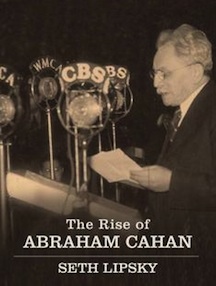By Lewis Fried
At a time when American-Jewish identity is being re-explored, most importantly in the “Pew Report,” we have a chance to ask, once again, “Who was Abraham Cahan?” Seth Lipsky offers us an engaging answer.
For the first half of the twentieth century, Abraham Cahan was known foremost to Yiddish readers as the editor of that peppery, socialist newspaper, the daily Forvertz. Its achievement was making accessible—and interpreting—contemporary issues for a Yiddish-speaking public. Cahan is better known today as an American-Jewish author. His The Rise of David Levinsky is the “autobiography” of a poor Talmud student, emigrating from Eastern Europe, whose driving ambition transforms him into a millionaire in America’s garment industry. At the end of the book, he is gutted by the raw spirit of capitalism and secularism. He is lonely, unhappy, and unloved.
The Rise of Abraham Cahan is especially good at presenting, in short compass, the drifts of American and European politics that Cahan and his newspaper navigated. Under his direction, the Forvertz became a paper commanding attention; his novels and stories remain landmarks, pointing out the situation of the Eastern-European Jew within the modern world. Zionism, universalism, religion, American democratic ideals—could they be harmonized? And if not, which would be the hammer, and which the anvil?
Lipsky underscores the conflicts between Cahan’s “universalist, radical self” and his Jewish commitments. Lipsky turns to Cahan’s early life to trace the origins of the problem. Cahan was born in 1860, in Podberez’ye, Lithuania; soon after, the family moved to Vilna, the fabled “Jerusalem of Lithuania.” As a shaper of sensibilities, Vilna well-served the young boy. It had the fervor of rabbinic learning, and the fever of the Jewish Enlightenment. By the time Cahan was a young man, he was drawn not only into the secular world, but also into the “revolutionary underground.” The police became interested in his politics, and after an interrogation, Cahan fled. In 1882, he arrived in America, and after a period of factory work, began making a name for himself in journalism, socialist politics, and American literature.
Assuming the editorship of the Forvertz in 1902, Cahan announced the paper would have a large coverage and that “ ‘every line will be interesting to all Yiddish-speaking people…’ “ Whether Cahan “spit,” as one commentator termed it, in the face of the Yiddish language, by enhancing its flexibility, or accommodated the language to that of a new country, the Forvertz both documented and explained the resources of Yiddish culture finding its American voice.
Cahan started an advice-to-the reader column known as “A Bintel Brief ” [“A Bundle of Letters”]; he wrote about the need for unionization, and also for compromise; he addressed the racial hatreds of America, found best in the lynching of Leo Frank; he encouraged debates about American life, Jewish culture, and Zionism.
Many of his calls were controversial. A quick catalogue reveals the flames he stoked. Until America’s entrance into the Great War, he sided with Germany; during the Forvertz’s early years, he misunderstood the swelling appeal of Zionism to the Jewish public; he was not immune to the charge of deserting the “principles of international socialism”; by the 1930s, he was pushing his readers away from the Socialist Party and into the orbit of the American Labor Party; he fought against the appeal of Communism to the Jewish proletariat; he disputed Vladimir Jabotinsky’s militant Zionism for its impracticalities; he advanced the cause of literary realism; and he berated the novelist Sholem Asch for his warm reading of a Judeo-Christian tradition. In short, the problems he addressed marked the comportment of the Eastern-European Jew with American life.
Cahan’s death in 1951 was more than a singular tragedy. It was a landmark in the inevitable decline of Yiddish culture in America. It also revealed the need for a vigorous English-language Jewish newspaper. This last has a name: the Forward. Lipsky’s book happily celebrates what has been gained, and poignantly reminds us of the world that has been lost.
Lewis Fried (ΦBK, Queen’s College, CUNY, 1964) is Professor of English Emeritus at Kent State University and a resident member of the Nu of Ohio chapter of Phi Beta Kappa.




